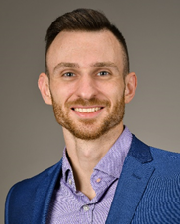Soto Lab Personnel
Santiago Ramirez, DVM – Senior Research Associate

Education & Training
B.S. Cell and Molecular Biology – Universidad de Chile, Santiago, Chile (2007)
DVM Veterinarian Medical Doctor – Universidad de Chile, Santiago, Chile (2012)
Research Interests & Experience
Dr. Ramirez is a DVM and Senior research associate at the Mitchell Center for Alzheimer’s Disease and Related Brain Disorders at The University of Texas Health Science Center at Houston, McGovern Medical School. Dr. Ramirez has developed his research background by integrating cell and molecular biology with the pathophysiology of human diseases using in vitro, ex-vivo, and in-vivo models. As Post Graduate researcher, he has experience in vascular diseases, prion diseases, toxicology, and drug delivery. As an animal model expert and skilled experimental surgeon, he is devoted to the study of neurodegenerative diseases related to misfolding proteins, aging, mitochondrial diseases, and Traumatic brain injury.
Sofia Elizabeth Sepulveda Contreras, Ph.D. – Research Associate
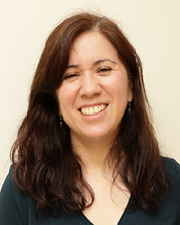
Education & Training
B.S. Medical Technologist (Tecnólogo Médico) – Universidad de Chile (2005)
Ph.D. Biomedical science ¬– Faculty of Medicine, Universidad de Chile (2013)
Research Interests & Experience
In the past, Dr. Sepulveda Contreras has studied different diseases including multiple sclerosis, ulcerative colitis, Crohn’s disease, and Chagas disease. Now in Dr. Claudio Soto’s Lab, her focus has shifted to mainly Alzheimer’s disease (AD) research with trying to understand the role of different cells during the development and progression of AD. Additionally, Dr. Sepulveda Contreras is continuing her search for more representative cellular models for AD studies. In this regard, she is working with iPSC derived cells, like microglia, neurons and astrocytes, and with 3D models like cerebral organoids. Dr. Sepulveda Contreras would like to make discoveries that contribute to the development of effective therapies for the treatment of AD.
Victor Banerjee, Ph.D. – Postdoctoral Research Fellow

Education & Training
B.S. Chemistry – Jadavpur University, Department of Chemistry, Kolkata, India (2006)
M.S. Organic Chemistry – Jadavpur University, Department of Chemistry, Kolkata, India (2008)
Ph.D. Biophysical Chemistry – Bose Institute, Department of Chemistry, Kolkata, India (2014)
Research Interests & Experience
Dr. Banerjee’s research focuses on understanding the molecular and structural basis of different neurodegenerative diseases. To this end, he has been able to leverage the recent developments in electron cryo-microscopy to take high resolution snapshots of amyloid filaments amplified, and purified from patient tissue and biological fluids, that are implicated in a range of neurodegenerative diseases. Dr. Banerjee’s expertise is in biophysical chemistry and protein engineering.
Tirthankar Sinha, Ph.D. – Postdoctoral Research Fellow

Ashaq Najar, Ph.D. – Postdoctoral Research Fellow
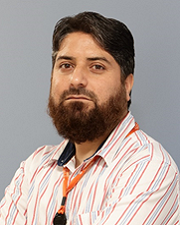
Education & Training
B.S. Biology – University of Kashmir, Srinagar, India (2006)
M.S. Toxicology – Jamia Hamdard University, New Delhi, India (2009)
Ph.D. Neurobiology – Jointly from National Center for Biological Sciences, Bengaluru and Jamia Hamdard, New Delhi, India (2019)
Research Interests & Experience
Dr. Najar is a neurobiologist interested in exploring novel genetic, molecular, or cellular processes underlying the development, progression, and mitigation of neurodegenerative and neurodevelopmental diseases, especially using stem cell-based tools. He strongly believes that stem cells hold a great promise in developing customized cell-based therapeutic agents for human diseases as well as models to study them. This makes him highly motivated to advance his knowledge and research skills to understand the disease mechanisms and targets of therapeutic intervention to combat CNS abnormalities using stem cell technology. Dr. Najar joined the Mitchell Center for Alzheimer’s Disease and Related Brain Disorders in 2022 within Dr. Claudio Soto’s neurodegenerative research laboratory. Here he seeks to delineate aspects of pathogenesis of Alzheimer’s disease using human brain organoid transplantation and chimeric mice.
Earlier in Dr. Najar’s research, he established and characterized highly reproducible multipotent neural stem cells from human pluripotent stem cells (hESC and hIPSC) to be used as a reductionist system to study aspects of serotonin biology and Alzheimer’s disease. His work also includes developing patient-specific iPSC and neural stem cells to study Alzheimer’s disease in the context of APOE genotype-dependent differential mitochondrial organization and biogenesis.
Suelyn Koerich, Ph.D. – Postdoctoral Research Fellow

Education & Training
B.S. Pharmacy (PharmD.) – União de Ensino do Sudoeste do Paraná, Dois Vizinhos, Paraná (2010)
M.S. Pharmaceutical Sciences – Universidade Estadual do Oeste do Paraná, Cascavel, Paraná (2018)
Ph.D. Biological Sciences: Physiology and Pharmacology – Universidade Federal de Minas Gerais (UFMG) Brazil (2022)
Research Interests & Experience
Metabolic alterations associated with neurodegenerative diseases; Biological mechanisms associated with risk factors for Alzheimer’s disease. Experience in mouse management (animal handling, breeding, weaning, behavior tests, genotyping, etc.); Experience in biochemical and histological techniques (immunohistochemistry and immunofluorescence, ELISA, microscopy and image analysis); Experience with brain dissection, stereotaxic surgery and intrahippocampal injection.
Michelle Pinho – Research Assistant III/Lab Manager

Education & Training
B.S. Biological Sciences – University of Texas at El Paso (2015)
Research Interests & Experience
After 5 years of clinical experience, Michelle shifted her focus to translational science. She focuses on developing biochemical assays for early detection of misfolded proteins in biological fluids for neurodegenerative diseases including Alzheimer’s disease (AD), Parkinson’s Disease (PD), and Cerebral Amyloid Angiopathy (CAA).
Nicole De Gregorio Carbonell, DVM – Research Assistant II
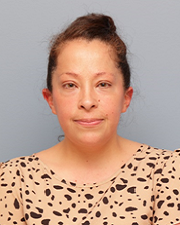
Education & Training
B.S. Veterinary Medicine – Universidad de Chile, Santiago, Chile
M.S. Wild Areas and Nature Conservation – Universidad de Chile, Santiago, Chile
DVM Veterinarian Medical Doctor – Universidad de Chile, Santiago, Chile
Research Interests & Experience
At the beginning of Nicole’s professional career, she worked in Animal Hospital for several years. She then moved to basic science while collaborating within a wide range of projects including the electrophysiology field, extreme environment medicine, cardiovascular research, and eventually to neurodegenerative research. She remains very interested in translational medicine and how from the basic sciences we can be able to improve the health and well-being of humans and animals.
Camila Gherardelli Brooks, M.S. – Research Assistant II/Ph.D. Student
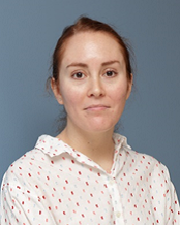
Education & Training
B.S. Biotechnology – Mayor University (2013)
M.S. Cellular Biology and Neuroscience – The University of Kaiserslautern (2016)
Research Interests & Experience
Camila received her Bachelor of Science degree in Biotechnology from Mayor University in 2013 and master’s degree in cellular biology and neuroscience in 2016 from the University of Kaiserslautern. Along the way, she became increasingly interested in the molecular mechanisms that lead to neurodegeneration, particularly in Alzheimer’s disease. After graduating, Camila worked with Dr. Inestrosa at Universidad Catolica de Chile, where she studied glucose metabolism alterations in Alzheimer’s disease. In 2019, Camila joined the cell and molecular biology PhD program. Her current research focuses on understanding the role of ApoE, the biggest genetic risk factor for Alzheimer’s disease, in embryonic neurogenesis.
Tyler Allison – Research Assistant II
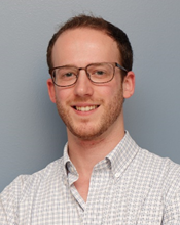
Education & Training
B.S. Biomedical Sciences – Colorado State University (2017)
Research Interests & Experience
Cellular and molecular mechanisms of neurodegenerative diseases; 2.5 years in clinical R&D and 2.5 years in academic research
Carla Barria Loaiza – Research Assistant I
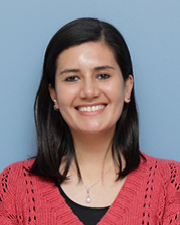
Education & Training
B.S. Biochemistry – Austral University of Chile, Valdivia (2011)
M.S. Microbiology – University of Concepción (2015)
Research Interests & Experience
Characterization of conformational properties of disease-associated, misfolded proteins and the role of protein misfolding in the pathogenicity of neurodegenerative disorders.
Natalia Astudillo Corral – Research Assistant I
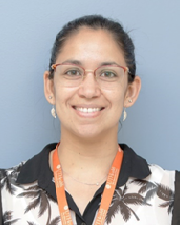
Education & Training
Medical technologist, emphasis Morphopathology & Cytodiagnosis – Universidad Nacional Andrés Bello (2014)
B.S. Medical Genetics – Universidad de Valencia, España (2015)
M.S. Medical Science, emphasis Cellular & Molecular Biology – Universidad de Valparaíso, Chile (2021)
Research Interests & Experience
Natalia has worked with hearth tissue associated to induced diabetes in rats and with knockout mouse of adenosine A2a for placenta injury. She would love to continue learning in all areas of clinic therapy
Danielle Harrison – Research Assistant I

Education & Training
B.S. Behavioral Neuroscience – Saint Edward’s University (2022)
Research Interests & Experience
Neural mechanisms, protein structure, protein misfolding diseases, signal transduction
Damian Gorski – Ph.D. Student
